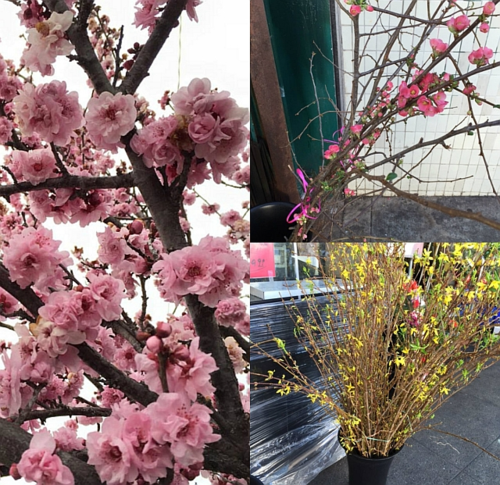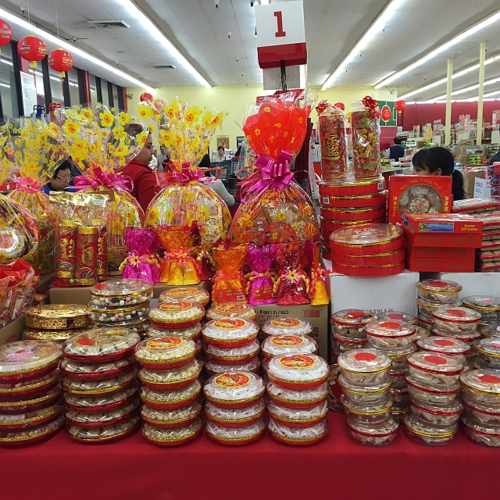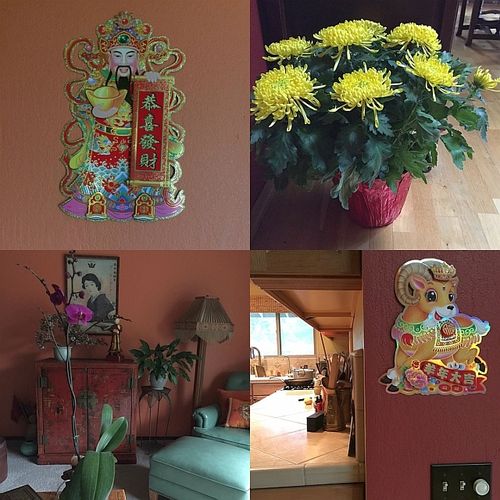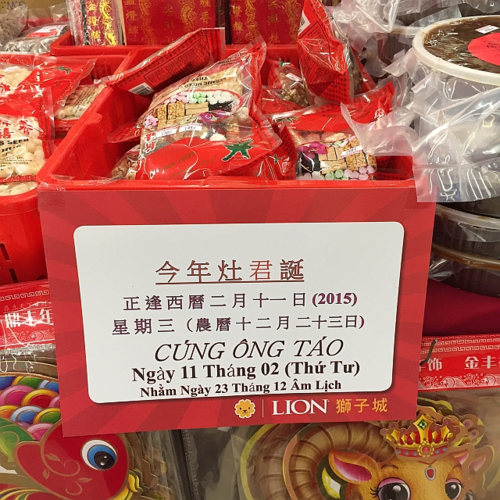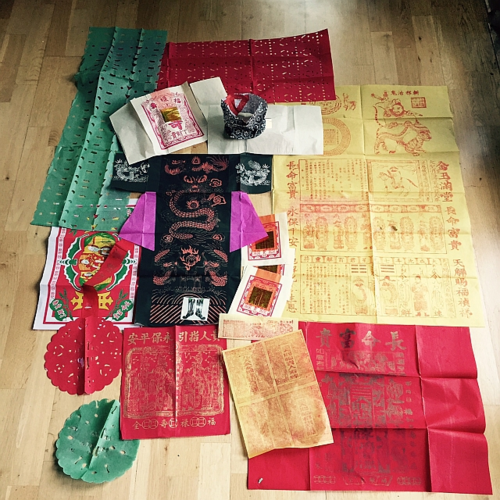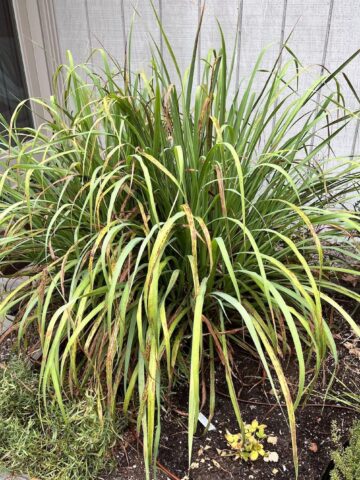Bodacious blossoms are now gracing many trees in our neighborhood as well as being sold in Asian enclaves. (Above is non-fruiting plum (I think), quince and forsythia.) Whenever these blooms happen, I feel that the Lunar New Year is truly upon us. “The blossoms always bloom going into Tet and your birthday,” my husband said as I snapped the above photo. Birthday flowers from nature are nice but the New Year always underscores the sense of renewal and rebirth that is at the heart of the ending and beginning of a lunar calendar.
In case you’re wondering, my birthday falls on February 9 (I turned 46) and the Lunar New Year -- a.k.a., Chinese New Year, Spring Festival, Tet Nguyen Dan, falls on February 19. We’ll be entering the Year of the Sheep or Goat or Ram. The animal that you choose depends on your culture. In Chinese, the character for sheep and goat are the same. Vietnamese people prefer goat. For that reason, last week, I went to a Chinese market and I bought a good luck goat wall hanging for our house.
My family has never been super superstitious. Tet has been a time of reflection, quiet, and food. I make sweetmeats like candied orange peel and hopefully, this year will also make banh chung – square Tet sticky rice cakes filled with mung beans and fatty pork. That, along with Viet charcuterie (the items that go into banh mi minus the pate), pickles and some pork riblets simmered in caramel sauce are my favorites. I’ll be swinging into the food mode over the weekend. It’s my culinary ritual. (Read more in this post: "Why Vietnamese Tet is for Home Cooking.")
At Vietnamese markets you're likely to see the variety of things you can buy near the cash registers:
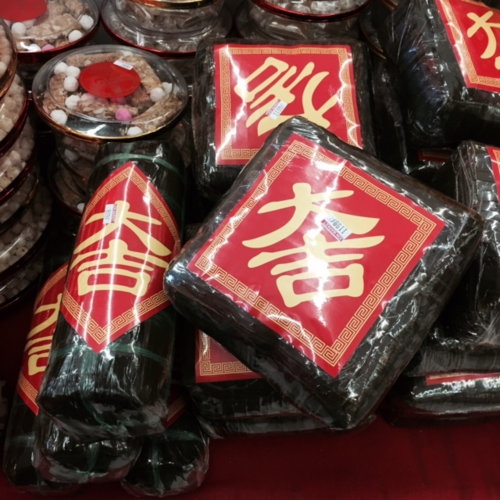
In advance of all the cooking, I tidy up the house and tick off obligations – projects for clients and a book proposal to my editor. Decor is important. My husband refreshes the orchids in the house and hangs up not just the new goat but also some of our favorite Tet figures – the good luck god who greets people when they enter our home and the prosperity fire crackers at our window. Their placement is to welcome in positive things for the new year. Chrysanthemums are also in order and a vendor at our farmer's market had some gorgeous ones.
It will the Year of the Green Wood Sheep, which many people feel is a bad thing. I've seen stories from the Los Angeles Times and CNN about Chinese people not wanting to have babies during the Year of the Sheep. No sheep babies? That’s absurd. From what I know, they are not shy or weak. My husband was born under this sign and has no problem being a ram/goat; he doesn't like to described as a sheep.
Sheep people are loveable, gentle and calm. They’re considered to be passive, loyal, generous and kind-hearted. They’re sensitive to art and beauty, enjoy quiet living, and are known to be wise and compassionate. On the flip side, they’re prone to worrying and can be shy, pessimistic, moody, and puzzled about life. They tend to be timid and prefer to be cared for by others.
Celebrity sheep include: Michelangelo, Mark Twain, Thomas Alva Edison, Muhammad Ali, Rudolph Valentino, Rachel Carson, Pierre Trudeau, Barbara Walters, Orville Wright, Nicole Kidman, Julia Roberts, Amy Lee, Bruce Willis, Benicio Del Toro, Claire Danes, Jamie Lynn Spears, and the Empress Dowager Cixi (remember The Last Emperor movie?). If you avoid having a sheep baby, you may be missing out big time.
This year I thought of observing the Kitchen God ceremony, which falls on Wednesday, February 11. In Chinese tradition, the Kitchen God (Tao Quan in Mandarin) keeps watch over your hearth and hears everything that goes on in your household. Each year he ascends into heaven to report how you’ve done to the Jade Emperor. To prep the Kitchen God, you sweeten him with food and maybe smear honey on his paper lips so he’ll say nice things to the emperor about you. To help him on his way to heaven, you ceremonially burn him via joss paper.
In Viet tradition, Tao Quan is a threesome -- a woman and two men, who make an annual report to the Jade emperor. They are supposedly echoed in the 3 legs/feet/supports of a charcoal brazier used in Viet kitchens.
The folk story has many renditions but I found a particular one to be charming. It’s posted on this site and others, attributed to a man named George F. Schultz:
The Three Kitchen Gods
Long, long ago, when Earth and Sky met in the Valley of Whispers, in the dense, green forest there lived a woodcutter and his wife. They were very poor and oftentimes the man was unable to earn enough to buy their food. Frustration and worry drove him to drink, and he would come staggering home at night in a vile mood.
Since there was only his wife to listen to him in their ramshackle cottage, he poured out all manner of abuse on the poor woman. Because she was his wife, she had to accept it. Sometimes he would try to appease his rage by smashing the furniture; but when he took to beating her she could endure it no longer. One night, she fled the cottage and was never seen there again.
For days and weeks, the woman wandered in the forest. She was hungry and her feet were torn and bleeding. Finally, she came to a hunter's cabin. The owner was an honest man, who gave her food and permitted her to rest in his home. She kept house for him then, and after some time they were married. They lived together in great happiness, and it seemed that the woman had forgotten the terrors of her previous marriage.
One day, when Tet (Vietnamese New Year) was approaching and the hunter was out in the forest looking for game, a beggar knocked at the door of the cottage and asked for alms. He was clad in rags and his hair was matted and unkempt. The compassionate woman prepared a meal for the man; while he was eating, she suddenly recognized him as her former husband.
The beggar was still eating when the woman heard the steps of her returning husband. In her mind's eye she saw rapid end of her newfound happiness and became panic-stricken. Quickly she hid the beggar under a haycock [rounded pile of hay].
The hunter had been very successful that day and was returning home with some excellent game. As soon as he entered the cottage, he prepared to roast it in the haycock quite unaware of the beggar's presence there.
When the beggar found himself ablaze, his first impulse was to cry out; then, fearing that the hunter might kill the woman on discovering him there, he remained silent.
As tongues of flame consumed the haycock, the poor woman was torn with grief. She realized of course that her former husband was meeting death for her sake and that she did not want. Hesitating for no longer than a moment, she threw herself into the fire in order to die with him.
The hunter cried out in dismay when he saw what his wife had done. He tried to pull her back but was unable to do so. Thinking that some act of his had driven her to such desperation, he too jumped into fire, preferring to die with her rather than to continue to live without her.
When the people learned of this touching story, they bowed their heads out of respect for the noble motives that had brought on the deaths of the woman and the two men. They were later acclaimed as Tao Quan, the Three Kitchen Gods.
In Vietnamese tradition, the woman ensures your household’s food supply, the first husband takes care of the general operations of the home, and the second husband looks after the kitchen. Together, they represent a home.
The Vietnamese are always tweaking things to be a little different than the Chinese. Carp are involved in the Viet Kitchen God ceremony as the gods ride on carp to heaven. You're suppose to release live golden fish in their honor. Treat the gods well and a week later, they'll return to your home to guard over it. You're suppose to have a feast for them upon their return, which is coincidentally just around Tet!
In any event, I bought a little joss paper kit for the Kitchen God ceremony, marked at the Chinese-Vietnamese as the kit for Cung Ong Tao, which roughly means tribute to Tao Quan. Upon opening it, I didn't count three of anything, but only one outfit and image of a man. The paper also kind of smelled odd. I consulted with my father, Bo Gia, who wrote:
There's a difference between Vietnamese and Chinese traditions. I don't know if those papers are for the Chinese guy or Vietnamese guys. It might be for the Chinese guy. Anyway those Ong Tao do not have pants, just hat, tunic and boots. [That is true, mine lacked pants.]
People use this occasion to clean up things in the house and prepare for the coming new year.
Better discard those papers in trash can. Flowers are nice.
God bless and have a nice New Year of the Goat.
My dad helped me to refocus on what Tet really means to me. I thought of the Vietnamese Kitchen Gods as representing unity, a well-rounded approach to taking care of one’s home and hearth. That is what matters most. I’m not burning the joss paper. I’ll use it as festive decor.
What are your plans for celebrating the Year of the Sheep/Goat/Ram?













